All Aboard - The Railroad in American Art, 1840-1955)

Hello friends and Hivians. All aboard! I will be your Conductor today to show you some trains, railroad history and some other railroad related things. A bit different look as these were made from artists with thier brushes,paints and other art tools. Still take a seat and imagine the train moving with its chugga chug sound and hear it's whistle echo miles away.
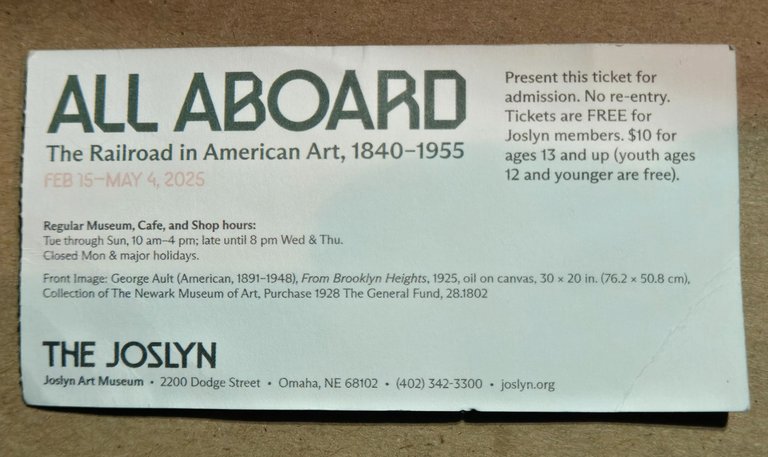
I'm back at a familiar place (Joslyn Museum)this time for an exhibition I just simply couldn't miss this one. I knew about it for awhile and it seems it took forever to get here. The exhibit is titled, All ABOARD The Railroad in America Art, 1840-1955. The doors opened on February 15th and it will be here until May 4th. Now the general museum is free of charge but this particular exhibit will cost you a $10 ticket(ticket above)to view unless your Joslyn member which would be free. If you want to visit the address of the museum is at:
2200 Dodge Street
Omaha, Nebraska 68102
I spent a bit over a hour looking at every piece of art. In total I would say there was around 40 to 50 pieces. So let me highlight some of them to you.
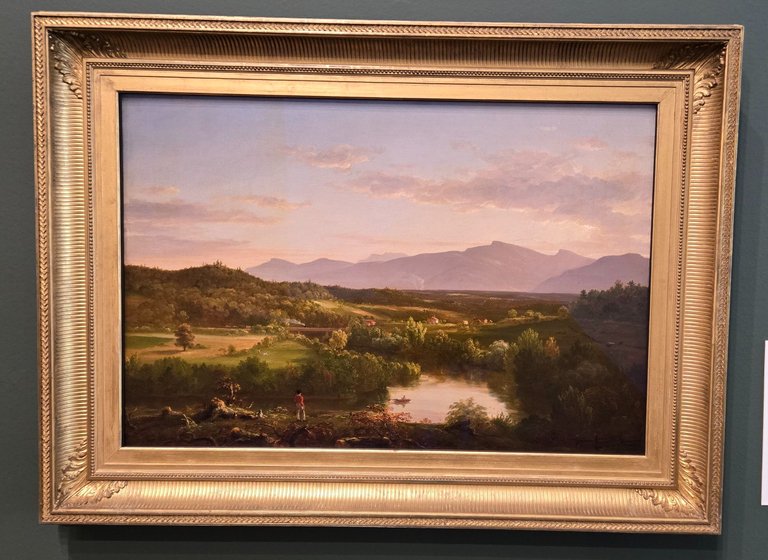 River in the Catskill, 1843
River in the Catskill, 1843
Painter: Thomas Cole
Cole and some other artists were part of a group later called the Hudson River School. This picture illustrates that the new infrastructure should be approached cautiously. The steam-powered engine is over whelmed by the beauty of upstate New York. The question is its new place right for one with nature?
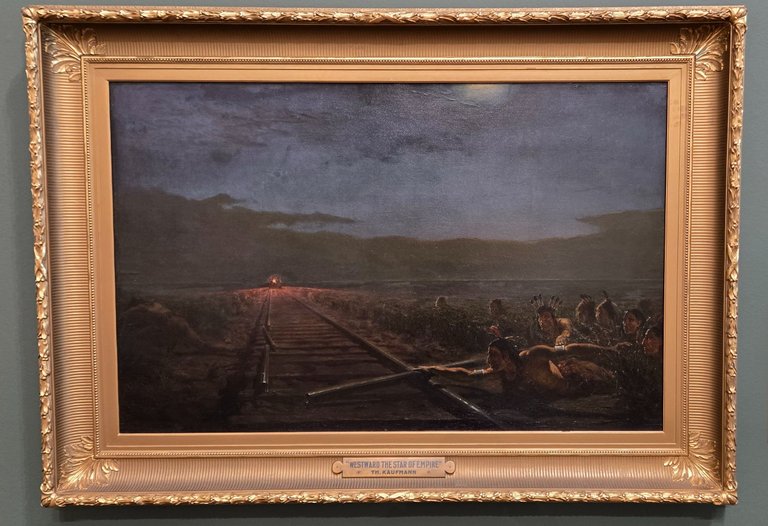 Westward the State of Empire,1867
Westward the State of Empire,1867
Painter: Theodore Kaufman
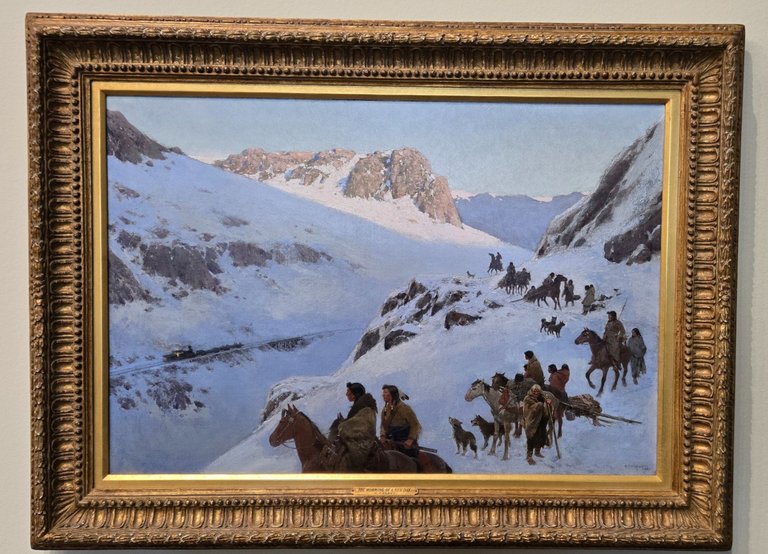 Morning of a New Day, 1907
Morning of a New Day, 1907
Painter: Henry Farny
I can tell you that the indigenous people of the time in America were probably not fans of the Westward expansion of the railroad. The first photo shows a group with a plan to derail an incoming train. Yes, there were occurrences of things like this that happened. I can't blame them, treaties were broken, land taken, food sources depleted, and thier way of life/cultures were much altered. The second photo to me shows a time where the small population of the indigenous people had to face the hard truth. Tracks were laid, battles were fought and lives were lost. Yes the mid 19th century railroad movement West wasn't all glorious.
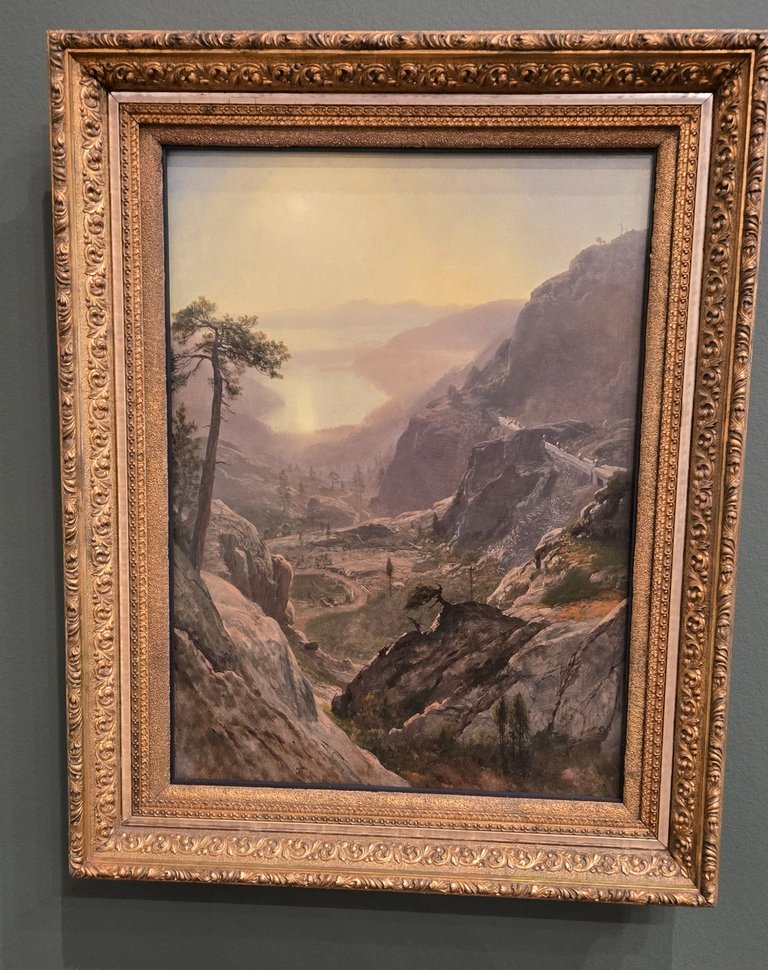 View of Donner Lake, California 1871-72
View of Donner Lake, California 1871-72
Painter: Albert Bierstadt
Donnor Lake was a crucial site for the completion of the Transcontental Railroad. The Central Pacific Railroad hired many Chinese people to blast through landscapes here which were on the lands of the Wašišiw or Washoe, Native American tribe. Railroad magnate, Collins Hungington hired Bierstadt to paint this scene as he seen it as a great accomplishment. The picture contrast a harmony between nature and human power.
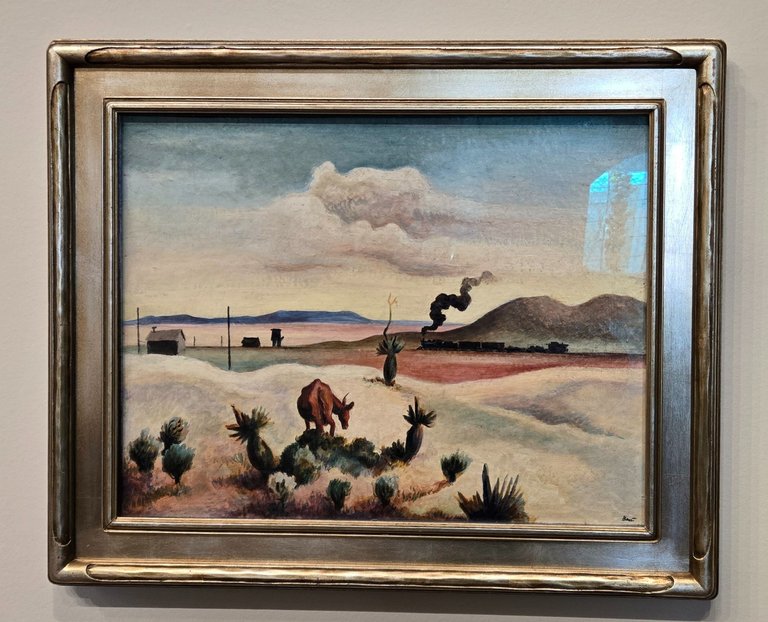 New Mexico (Landscape) 1926
New Mexico (Landscape) 1926
Painter: Thomas Hart Benton
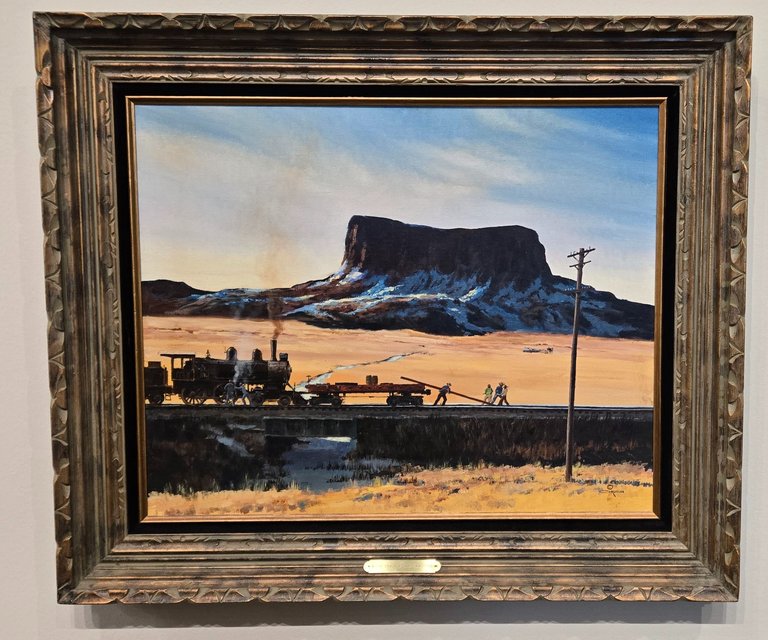 Work Train at Wagonmound Circa 1930's
Work Train at Wagonmound Circa 1930's
Painter: Otto Kuhler
Both pieces of artwork through New Mexico in places where its very open.New Mexico where you can feel the heat of a desert, snow in the mountains and even sometimes snow covered desert landscape. By the turn of the 20th century the train covered all landscapes throughout the country.
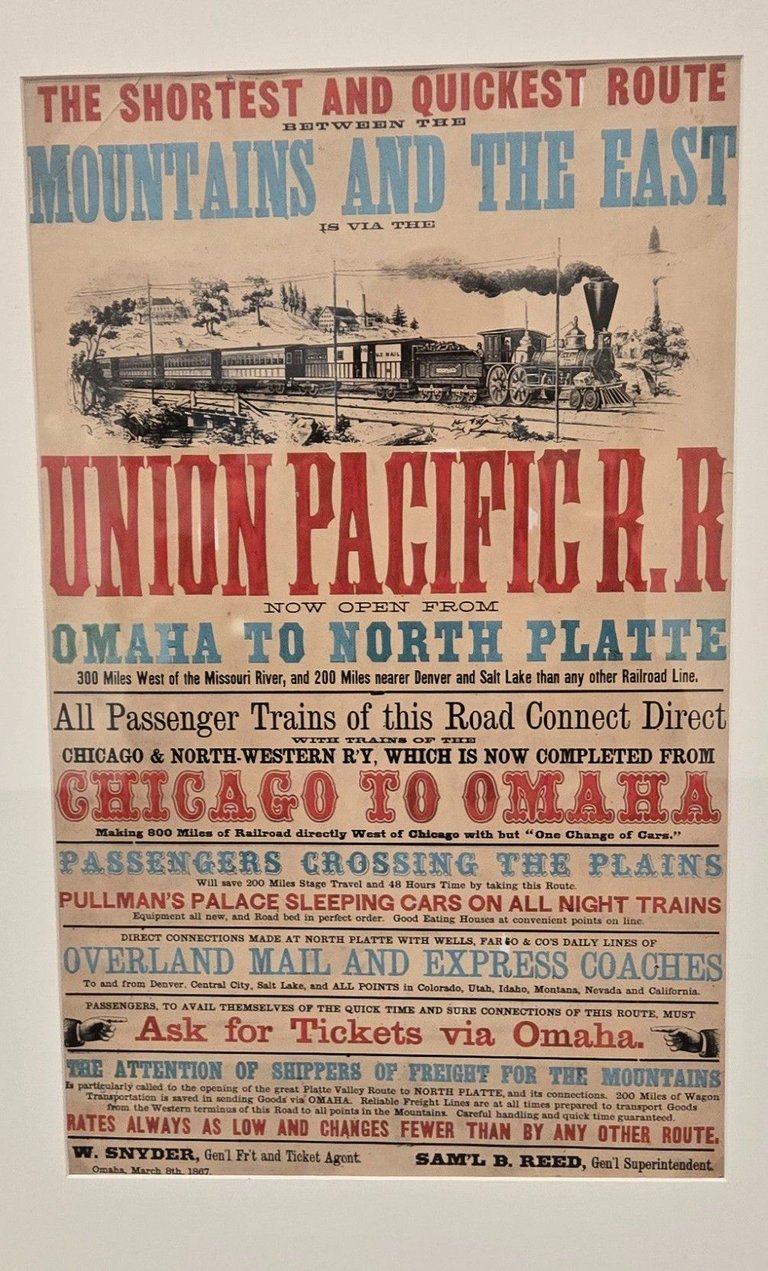 Poster Advertisement for the Union Pacific Railroad 1867
Poster Advertisement for the Union Pacific Railroad 1867
Horton & Leonard
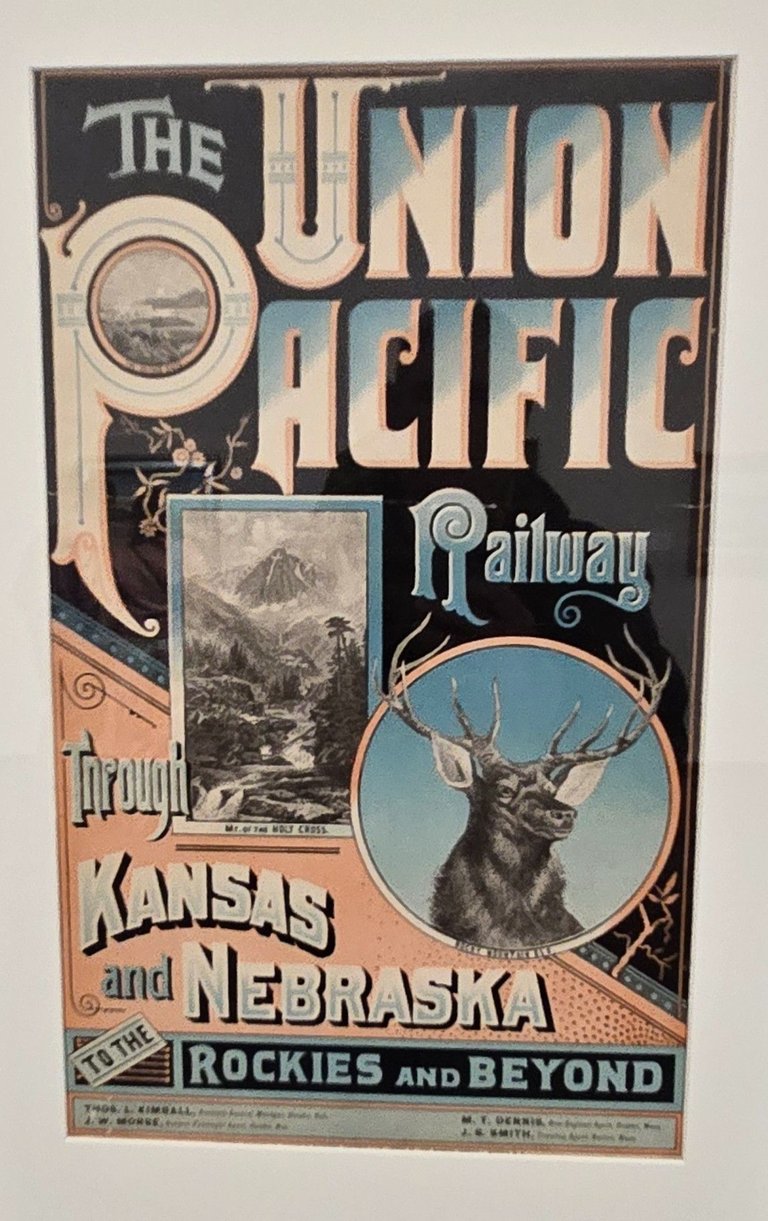 Poster Advertisement for the Union Pacific Railroad 1880-1885
Poster Advertisement for the Union Pacific Railroad 1880-1885
Matthew, Northop & Co.
Here we have some early Union Pacific Railroad advertisement for passenger travel. Ever since trains came on the scene they have offered transportation for both people and goods. It would have been cool to travel across country in those times. These are pretty cool as they have local ties to me. Just FYI Union Pacifuc is still around and is headquartered in Omaha, Nebraska. The only bummer is they don't offer passenger travel now.
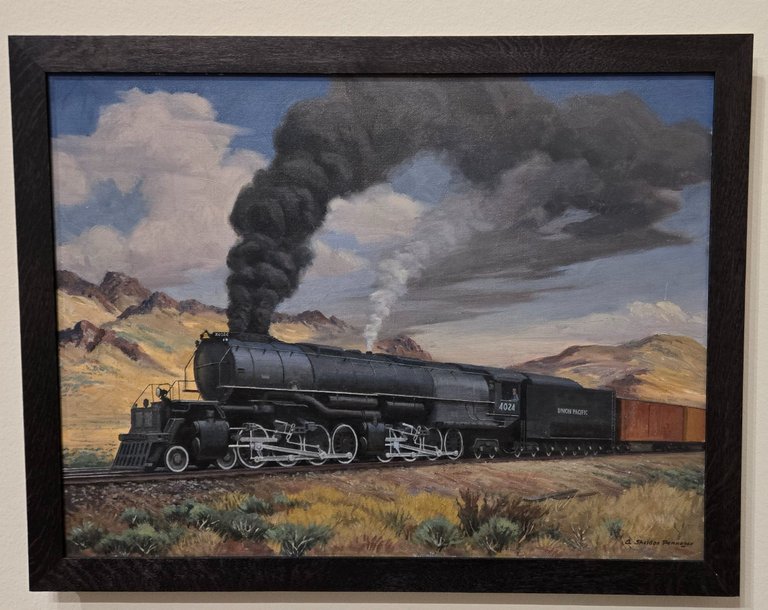 Union Pacific Circa 1930's-40s
Union Pacific Circa 1930's-40s
Painter: Albert Cheldon Pennoyer
Pictured but not mentioned on the depiction is one of Union Pacific's iconic locomotive, the "Big Boy." Union Pacific produced 25 of them from 1941-1944. The last train of its production is No. 4024 (one in this painting) since No. 4000 was its first. Today only one runs No. 4014 but there are another 7 located throughout the country on display to see. A cool in charge train which happens to be my favorite of all trains.
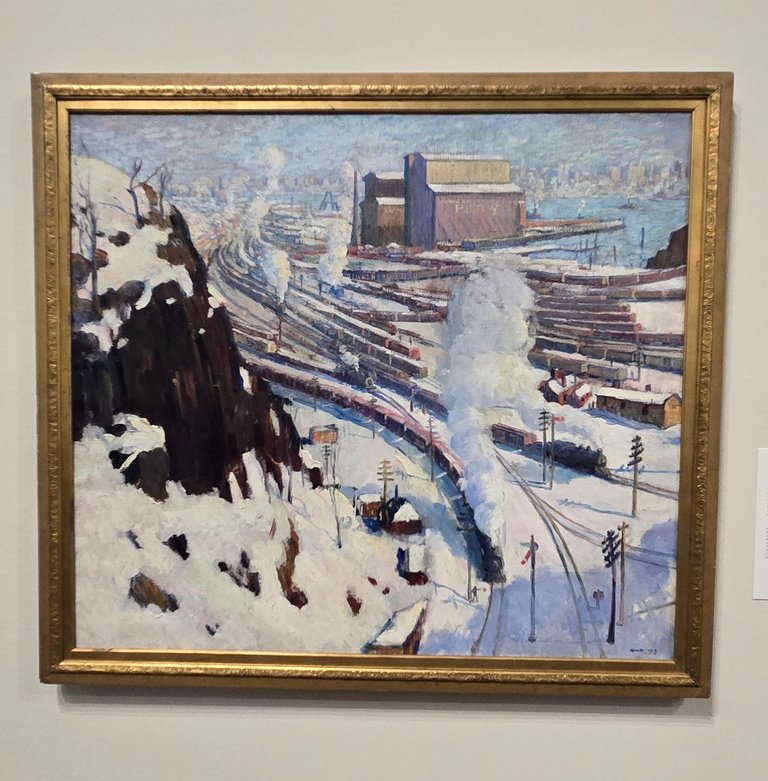 Terminal Yards 1912-1913
Terminal Yards 1912-1913
Painter: Leon Kroll
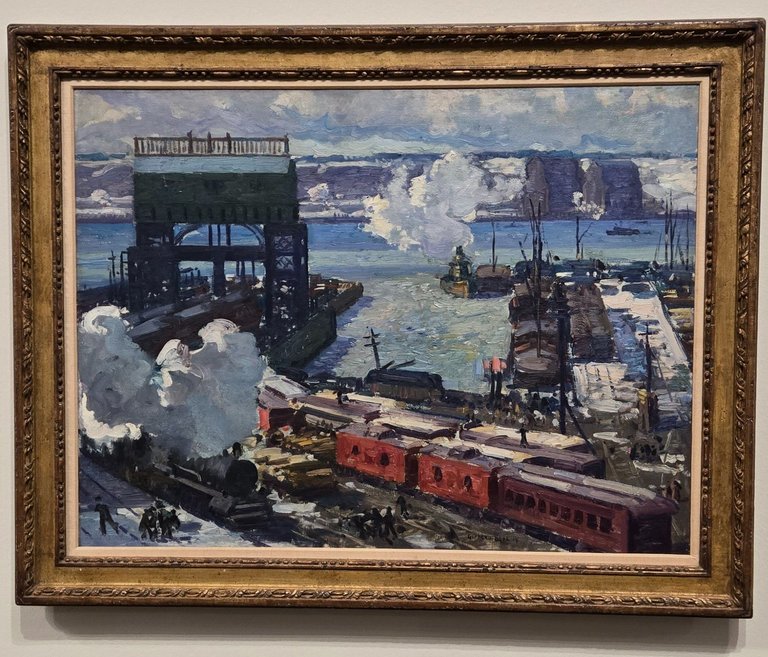 Freight Yards 1915
Freight Yards 1915
Painter: Gifford Beal
The first painting shows a busy winter day at Weehawken Terminal, New Jersey. This terminal across from the Hudson River offered train and ferry connections to Manhattan in New York City. During the mid 19th and early 20th centuries there were many railroad terminals across the country in not only large cities but small towns. Dual freight Yards were and are still a thing along coast cities. There also use to be a lot of them along side bigger rivers and lakes more inland.
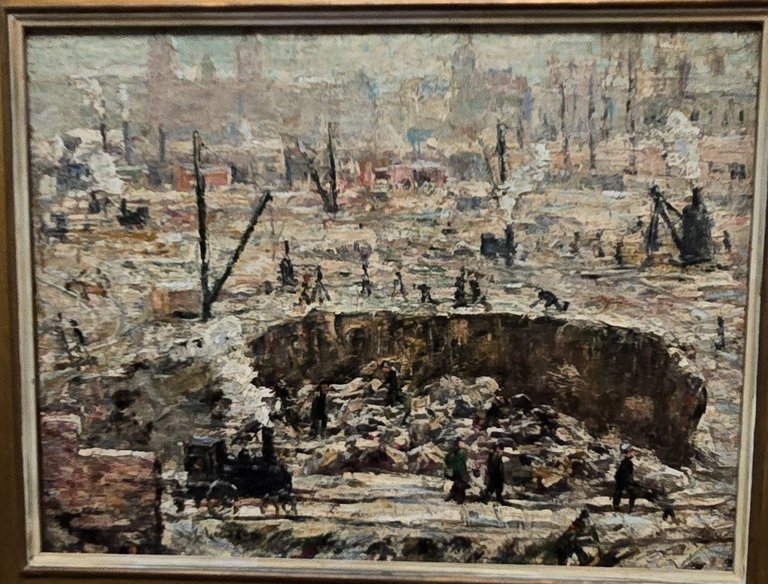 Escavation-Penn Station Circa 1906
Escavation-Penn Station Circa 1906
Painter: Ernest Lawsom
Pennsylvania Railroad CEO Alexander seen that a train hub for traffic in and out of Manhattan would be a huge benefit. It was a big deal and it's building was all over the press. Lawsom couldn't help see its importance to the city and as an artist very much wanted to paint this escavation of it. Finished in 1910 and is still here today providing transportation for its passengers.
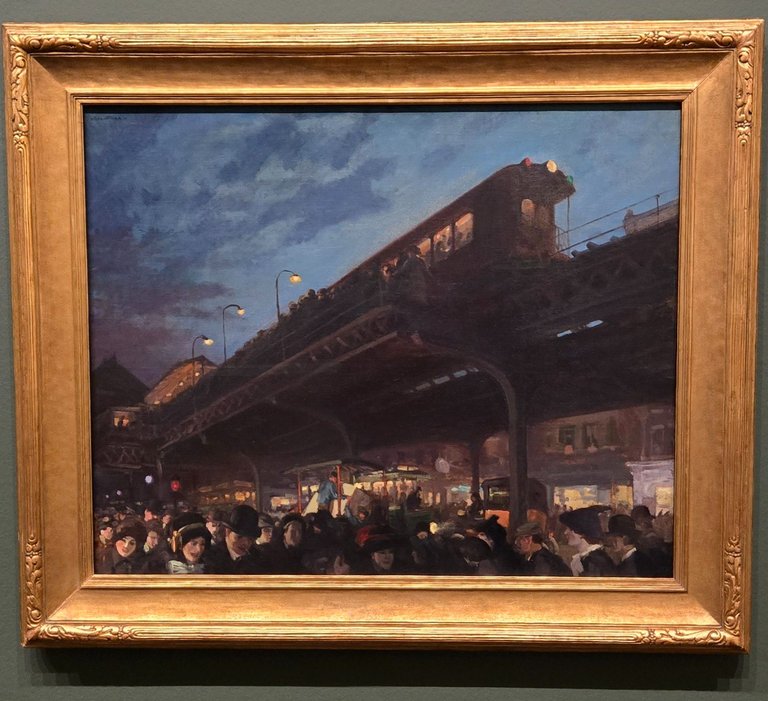 Six O'clock, Winter 1912
Six O'clock, Winter 1912
Painter: John Sloan
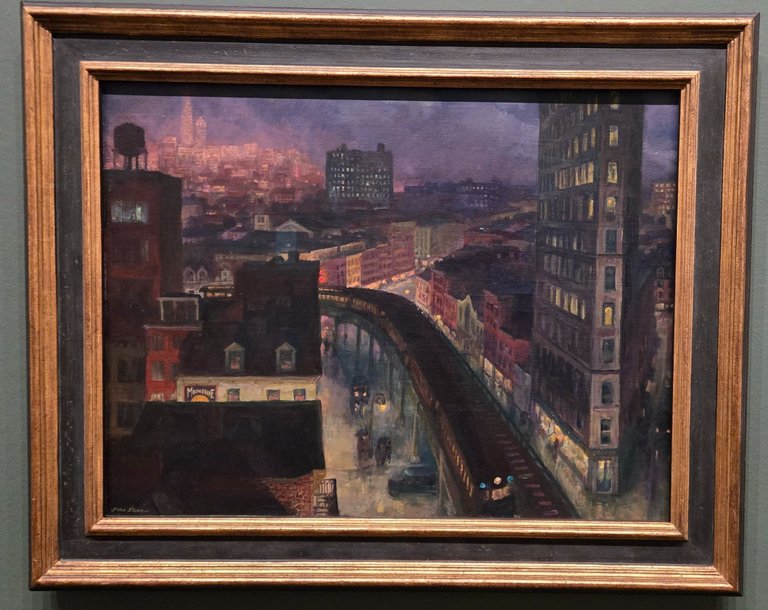 The City From Greenwich Village 1922
The City From Greenwich Village 1922
Painter: John Sloan
I love both of these New York City paintings from Sloan. It's really cool to see trains elevated above the ground in a city atmosphere. Its amazing to see them above store fronts, people and among other things. The first painting is from 3rd Avenue and the other from the Greewich Village community.
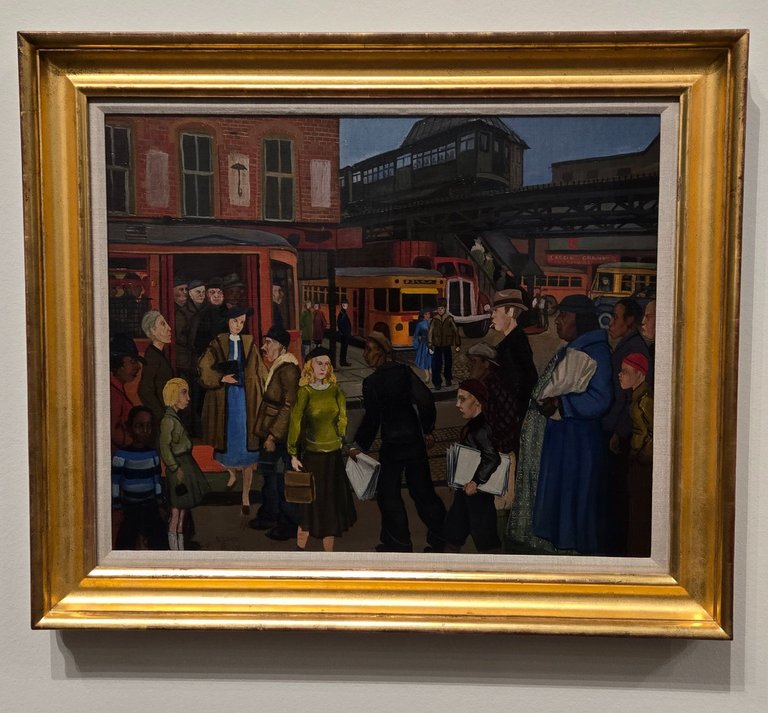 The Car Stop, 1940
The Car Stop, 1940
Painter: Allan Rohan Crite
At the end of the 19th century street cars re-shaped American cities. This painting shows a street car station on the South end in Boston. The street car networks in Omaha ended in the fifties. I learned by visiting this exhibit that Omaha had the second largiest network in the country behind the one in Boston. The good thing is the street car is coming back to downtown Omaha in 2027. I can't wait to experience it.
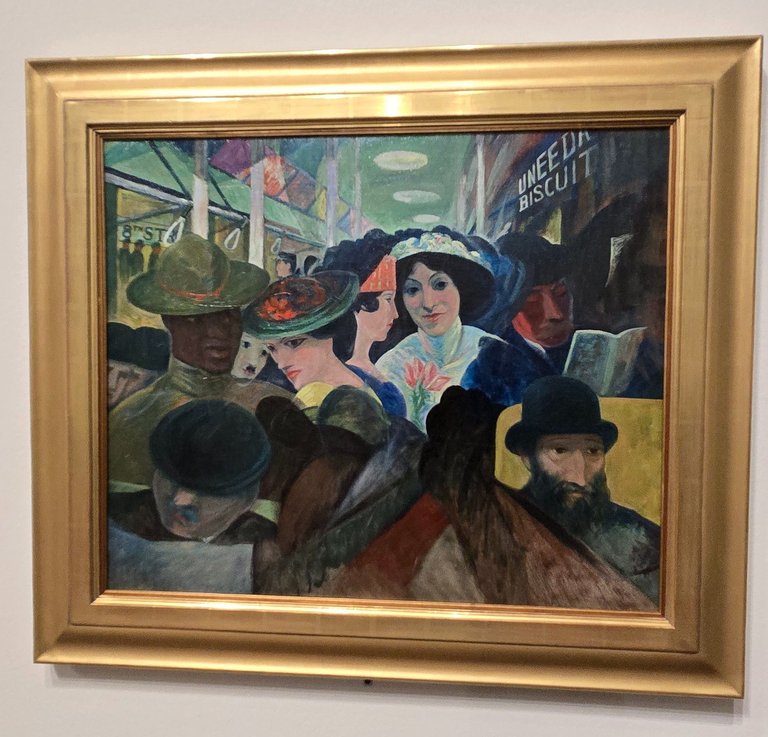 The Subway 1919
The Subway 1919
Painter: Walter Pach
In the frenzy of a filled subway car at 8th Street station in New York. Pach relates his painting to events in the city in the wake of WW I. Perhaps some adjusting to a civil life after the war and women looking forward to being allowed to vote.
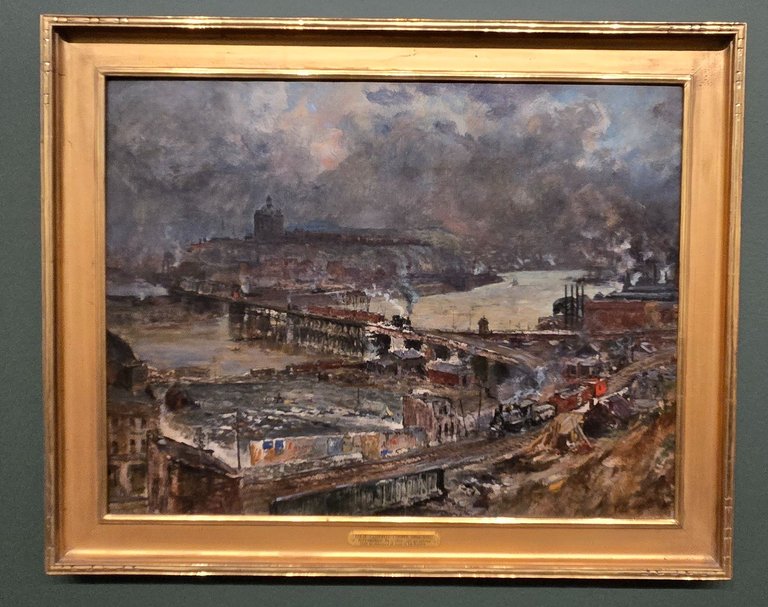 Pittsburgh, PA 1905
Pittsburgh, PA 1905
Painter: Collin Cambell Cooper
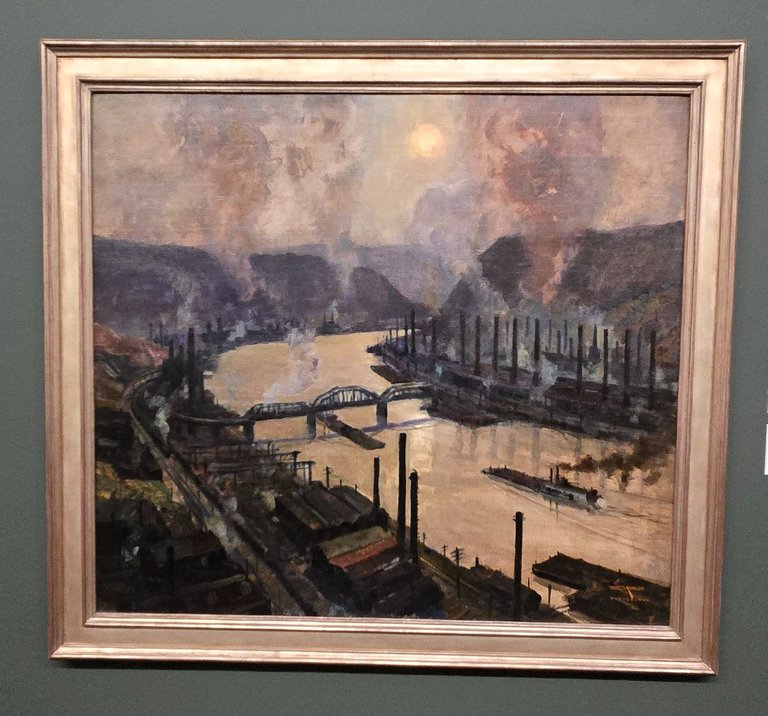 Steel Valley, Pittsburgh 1925
Steel Valley, Pittsburgh 1925
Painter: Otto Kuhler
In a city such as Pittsburgh, an industrial city known for its steel production, need its production of it moved. Trains are more than capable of carrying the heavy loads. I can imagine these type of industrial cities would be full of smoke in the air from factories and trains. In the winter the skies would have even showed it more.
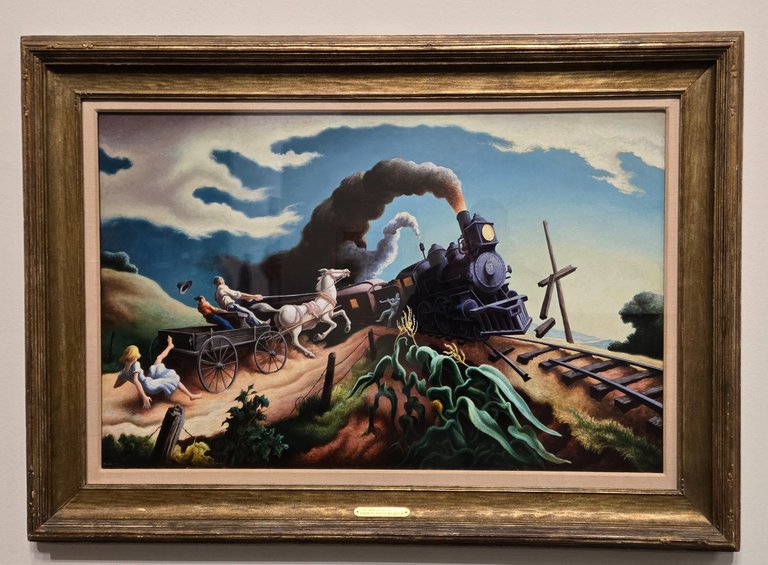 The Wreck of Ole 97 1943
The Wreck of Ole 97 1943
Painter: Thomas Hart Benton
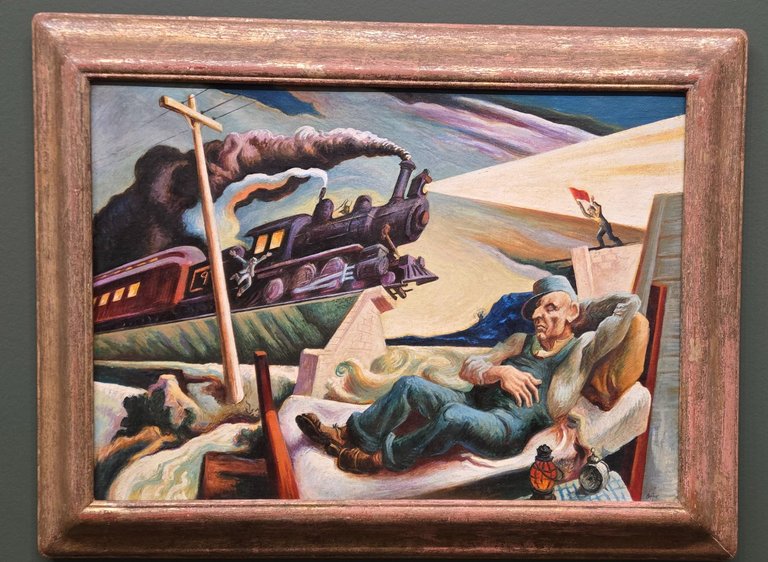 Engineer's Dream 1931
Engineer's Dream 1931
Painter: Thomas Hart Benton
The first painting represents a real life train wreck. It happened in 1903 with a Southern Railway train called Fast Mail and Numbered 97 derailed and fell into a revine. The accident took 11 souls that were onboard the train. Later in 1924 Vernon Dalhart recorded the song, Wreck of old 97 which was reputed as the first country song to sell a million copies.
The second painting tells the life of an engineer. Though the railroad can be big and beautiful it can also be exceptionally powerful which can lead it to being catastrophic.I take a few words from Kimberly Whiting (current Union Pacific employee) that were next to the painting:
You cant be afraid of what may happen or linger in a bad situation. Trust the team around you, trust in the overall goal, and give it your all. By doing this, your next dream will be full of happiness and success.
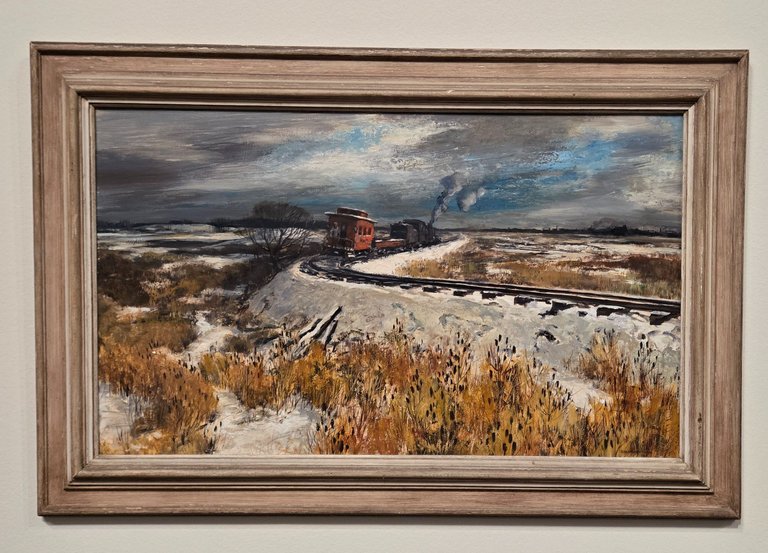 Swamp Spur 1944
Swamp Spur 1944
Painter: Carl Frederick Gaertner
The last photo I will share shows kind of ending of an era. By the mid 1940's competition with automobiles and airplanes basically forced some of the smaller railroad companies to fall. Passenger travel by rail is not the same as it once was with all the options availble in today's world. The word spur refers to secondary railroad lines that lead to industrial areas.
It was an exhibition I thought was worth the $10 especially if you are a train lover. When the train came on the scene it wasn't surprising to know that artists began painting them on canvas. The Railroad even though not glorious at times made America what it is today.
Take care, stay safe and enjoy the rest of the week. Until next time!
You can check out this post and your own profile on the map. Be part of the Worldmappin Community and join our Discord Channel to get in touch with other travelers, ask questions or just be updated on our latest features.
Hello @worldmappin 😎
Hello @coolmidwestguy😎
Ah cool, here we see what you mentioned, Chinese people were working in those huge projects to the West. And we also see that some people got very rich, the CEO while the industrial cities were growing, the beginning of a new era yes although as you say
But the "progress" arrived there to the West... I think this is a good way to see a part of your history through the evolution of big infrastructures, so thanks for sharing it!
Happy Tuesday amigo!
!LOLZ
!PIZZA
lolztoken.com
Fish and ships.
Credit: boboman
@coolmidwestguy, I sent you an $LOLZ on behalf of duvinca
(2/10)
Yes, the Chinese were a huge part of the the success of theTranscontinental Railroad. In fact,they are part of an amazing feat. At the end of the completion, over 10 miles of track was completed in a single day!
Yes a lot of bad was done but in the end a lot of good came out of it. Nearly two hundred years of railroad in America and it's still here in the form locomotives, subways and street cars.
Happy Tuesday to you too Amiga. Its freezing here, coldest day of the year! Where are you spring?
!LOLZ
!PIZZA
lolztoken.com
Prism, it's a light sentence.
Credit: reddit
@duvinca, I sent you an $LOLZ on behalf of coolmidwestguy
(1/6)
Delegate Hive Tokens to Farm $LOLZ and earn 110% Rewards. Learn more.
Oh keep warm, here it's getting warmer very subtly but it's less cold so spring is coming! 😁⚘
!INDEED
$PIZZA slices delivered:
@coolmidwestguy(1/5) tipped @duvinca
duvinca tipped coolmidwestguy
Seeing this paintings way back decades ago makes me feel more sad.
Just now ,@asiaymalay and I were talking how fast days was. There were a lot of changes and people we knew left.
Now, this pictures reminds me more of yesterday 🥹
There can be sadness in an older painting. I believe it touches us with the things that happened or things that aren't the same any more 😞 Historic reminders whether thier good or bad can do this.
And perhaps us aging who easily felt sad 😢
Getting more emotional
Yes aging, the older we get the more that changes. The things we once did are gone or no one wants to do them no more.
Wow I really loved these art collections of American RailRoads from the past times as they really bring out the lore of those past times.
Yes they defintely delivered a historic look at the past.
I do not know but this reminds me of the trains and tracks in Back to the future 3 a movie I watched a very long time ago.
What a great review of the history of the train through art! I loved the proposal. The works that most struck me were, on the one hand, those related to the expansion of the railway to the west and its impact on the native peoples. I knew part of it thanks to western movies but seeing their images represented in the paintings is more impressive. On the other hand, I was very attracted to Thomas Hart Benton's paintings. They conveyed to me a feeling of dream that reading their explanation I see that it is what the artist was looking for. The first of the real accident was sad but the message of confidence and hope of the second compensated for it. Thank you for sharing this history and art lesson!
I have picked this post on behalf of the @OurPick project! Check out our Reading Suggestions posts!
Please consider voting for our Liotes HIVE Witness. Thank you!
Thank you @palomap3 for the appreciation and support. Benton's artwork was a favorite of mine as well. I love artwork that portrays a message and one that tells of times past. I have always been fascinated with older steam trains so this exhibit was well worth the wait and time!
We were next where? In the painting? We don't know what will happen next😑 but those were awesome paintings that brings back memories. Where did your ride land you at?😬
Well for you the train takes you to past time where you want to visit the most 😊 Jump aboard the train title, Flash Backs 😜 Oh my journey hopefully lands me Happyville. Anyways I really enjoyed this exhibit and wish I could share more of the paintings. Like this one:
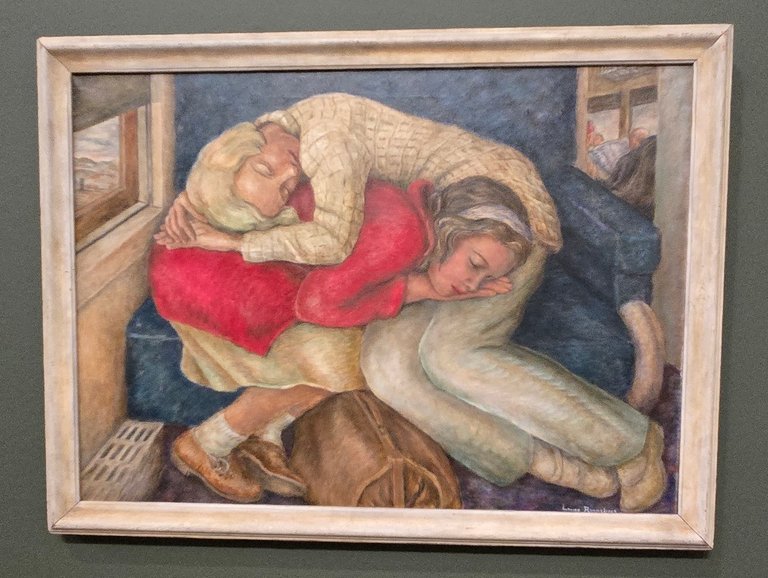
You and @lhes ?
Haha we weren't like that back when we are young 😆🤣
Probably😌😁, make part 2😌😛.
Part II would be chaotic it would have no flow.
😂😂
Awww, I'm so glad I came across your post. There are so many great pieces here, very different from what I am usually finding in galleries here. I love the theme and admire them for organizing such a thematic event.
Yes I had a blast I love train history. I seen it was coming a few months ago and had to check it out.
Railway meant a lot in the US history and had a big role in thr country's evolution, so it's just normal to see it on canvas too. You're lucky you could visit this exhibition and I also admire you 🫣
Thanks friend one of these days I will take a tour of Union Pacific Headquarters. I wonder what gems are in that building 🤔